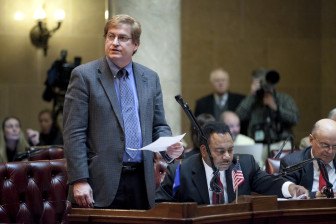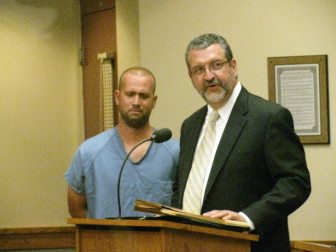Why Wisconsin Has Weak Laws on Drunken Driving
Legislators reject tougher penalties, even for repeat offenders. First of a series.
Making matters worse
In all, the Legislature’s 2013-14 session saw the introduction of more than a dozen bills to toughen state OWI laws. The bills drew almost no opposition from lobby groups or at hearings, aside from the Wisconsin Counties Association, which pegged them as “unfunded mandates on county taxpayers.”

State Sen. Tim Carpenter, D-Milwaukee, is dismayed by the Legislature’s failure to pass GOP-backed bills to toughen state penalties for drunken driving: “We blew a golden opportunity.” Photo Jan. 18, 2011. Photo courtesy of the State of Wisconsin.
Several bills passed the Assembly in amended form, including one to make all fourth-offense drunken driving a felony. But, with Fitzgerald as gatekeeper, only one penalty-toughening bill received a Senate vote. And that bill, introduced after the initial package by Darling and Ott, had unintended consequences.
The bill, which passed, created mandatory minimum penalties for drivers who cause substantial injury or death in their seventh or subsequent OWI offense. But a drafting error axed existing law allowing charges for simple injury crashes.
“It made (matters) worse,” Carpenter said. “Not only didn’t we pass stiffer penalties, the bill we did pass mucked things up.” He anticipates the need for corrective legislation next session.
Other failed GOP-sponsored bills would have prevented those who lose driving privileges due to OWI offenses from buying or leasing cars and barred those required to install sobriety-checking ignition interlock devices on their own cars from driving any vehicle without it.
Also going down in flames were Democrat-sponsored bills to require interlock devices for all OWI offenses, impound the vehicle registration plates of repeat offenders, and make first-offense drunken driving a crime in Wisconsin, as it is in every other state.

Bradley Erickson was convicted for homicide by drunken driving for a crash that killed three people on a highway near Madison. Erickson was sentenced to 13 years in prison and 15 years of extended supervision. His lawyer attributed the Iraq veteran\’s decision to get behind the wheel drunk to post-traumatic stress disorder. Photo Oct. 11, 2010. Photo by Ed Treleven / Wisconsin State Journal.
Rep. Josh Zepnick, D-Milwaukee, whose sister was killed by a repeat-offense drunken driver in 1990, introduced the impoundment bill and calls expanding the use of ignition interlock devices “a no-brainer, ‘cause you put the cost on the offender and it seems to change people’s behavior.”
But Zepnick declined to co-sponsor bills to impose a mandatory minimum and is ambivalent about making first-offense OWI a crime, given that “over 70 percent of first-time offenders do not repeat.” (On the other hand, three-quarters of the state’s OWI-related crashes causing deaths or serious injuries involve offenders with no prior convictions.)
In many cases, Zepnick said, the problem is not that the state’s laws lack teeth but that judges are disinclined to bite. He rattled off examples of drunken drivers who killed others and got off with light sentences, such as 60 days with work release.
“I know people in Milwaukee who steal from a gas station or sell a couple bags of pot who get more time than that,” he said.
Getting to the root
Carpenter believes all of the GOP-backed bills that passed the Assembly would have easily passed the Senate, had Fitzgerald heeded his appeals to bring them to a vote. He suspects Fitzgerald acted to protect a few lawmakers with election-related worries about making enemies or losing friends, who felt “I can’t in any way get the Tavern League mad at me.”

State Sen. Scott Fitzgerald, R-Juneau, defends the Legislature’s reluctance to pass tougher laws: “There is significant disagreement over whether simply hiking penalties will solve the problem.” Photo Jan. 18, 2011 by Mike DeVries / The Capital Times.
But Fitzgerald, while hailing Wisconsin’s “vibrant” beer and alcohol service industries, said the Tavern League’s influence was not the reason for the bills’ failure. The Senate moved instead “to combat drunk driving at the root of the problem by targeting substance abuse with a program that is proven effective.”
A bill passed unanimously late in the session hiked state spending on court-based substance abuse treatment and diversion programs by $3 million over two years. Fitzgerald said this approach has helped curb recidivism “while allowing offenders to get their addiction issues in check and go on to have productive lives.”
The Tavern League, which has backed tougher OWI penalties, also urges addressing drunken driving as a problem of addiction. “You can’t just say, throw the person in jail and two years from now everything will be fine,” Stenger said.
Since January 2013, when the two-year legislative session began, the Tavern League has reported spending $217,703 on lobbying; MillerCoors, another prominent state lobby group, spent $204,472.
During this period, the two groups have directed more than $80,000 in campaign contributions to state candidates, including $9,750 to Fitzgerald.
Political Contributions Tracker
Displaying political contributions between people mentioned in this story. Learn more.
- March 30, 2015 - Josh Zepnick received $50 from Tim Carpenter
Under the Influence
-
Wisconsin Is National Leader on Drunken Driving Test
 Dec 1st, 2014 by Kate Golden
Dec 1st, 2014 by Kate Golden
-
No Treatment For Many Drunken Drivers
 Nov 16th, 2014 by Sean Kirkby
Nov 16th, 2014 by Sean Kirkby
-
Advocates Say State Not Serious About Drunken Driving
 Nov 12th, 2014 by Bill Lueders
Nov 12th, 2014 by Bill Lueders






















I’ve said for years, that OWI laws should be three strikes style. Once you get to three, you lose your license for life. And there should be a free and easily accessible website of all three time offenders so private dealers and sellers don’t sell them cars. If they do, then they should also be held accountable.
Three OWI’s is pretty generous, but it would be possible. After all, how do people who oppose tougher OWI laws feel about pilots and school bus drivers who drink and drive? A vehicle is a vehicle and the same stringent laws should apply.
We’re talking deterrance? Why? Nothing deters an alcoholic from drinking. And that is what every repeat offender is, an alcoholic. They need help.
Why do we talk about this in a vacuum? The trend for drug enforcement has been slowly turning towards treatment as opposed to incarceration for years, why should drunk driving/alcholism be any different?
If you lose your license after 3 offenses, and you should, that would prevent many deaths.
The problem is that OWI’s are treated as a money making business. 2nd, 3rd, 4th, 5th AND 6th time drunk drivers can all too often get work release Huber privileges which net the local court systems over $175 a week for every week each offender serves that type of sentence. Compounded with repeat offenders knowing that is all the will happen to them as far a consequences of their taking careless risks is most of the problem. Start protecting the innocent public from these criminals (on both sides) and make a 2nd offense an automatic felony like most states have done for years.